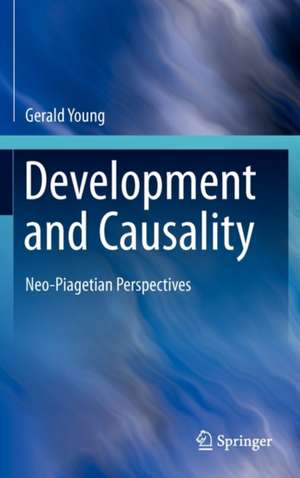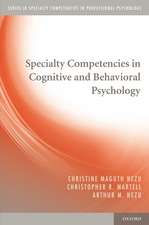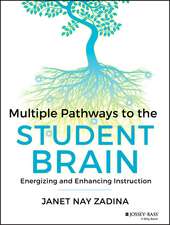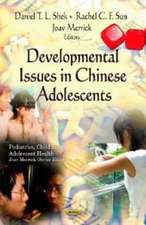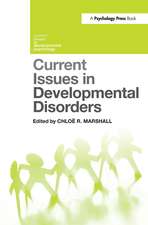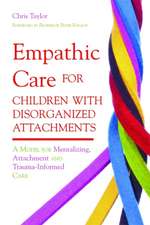Development and Causality: Neo-Piagetian Perspectives
Autor Gerald Youngen Limba Engleză Hardback – 28 iun 2011
| Toate formatele și edițiile | Preț | Express |
|---|---|---|
| Paperback (1) | 972.44 lei 6-8 săpt. | |
| Springer – 22 aug 2016 | 972.44 lei 6-8 săpt. | |
| Hardback (1) | 978.12 lei 6-8 săpt. | |
| Springer – 28 iun 2011 | 978.12 lei 6-8 săpt. |
Preț: 978.12 lei
Preț vechi: 1192.82 lei
-18% Nou
Puncte Express: 1467
Preț estimativ în valută:
187.19€ • 194.70$ • 154.53£
187.19€ • 194.70$ • 154.53£
Carte tipărită la comandă
Livrare economică 14-28 aprilie
Preluare comenzi: 021 569.72.76
Specificații
ISBN-13: 9781441994219
ISBN-10: 1441994211
Pagini: 849
Ilustrații: XXXVIII, 849 p. 66 illus.
Dimensiuni: 155 x 235 x 53 mm
Greutate: 1.38 kg
Ediția:2011
Editura: Springer
Colecția Springer
Locul publicării:New York, NY, United States
ISBN-10: 1441994211
Pagini: 849
Ilustrații: XXXVIII, 849 p. 66 illus.
Dimensiuni: 155 x 235 x 53 mm
Greutate: 1.38 kg
Ediția:2011
Editura: Springer
Colecția Springer
Locul publicării:New York, NY, United States
Public țintă
ResearchCuprins
Overview of the present work.- The Biopsychosocial Model and Bio-Personal-Social Models.- Piaget and Development.- The Present Cognitive-Affective Stage Model: I Cognition.- The Present Model: II Postformal Stage, Affective Parallels, Systems.- Substages in the Neo-Piagetian Models of Case, Fischer, and Young.- Parallels in Cognitive Substages and Socio-Affectivity in Case.- Parallels in Cognitive Substages and Socio-Affectivity in Fischer.- Case and Fischer on Language and the Brain.- Recent Case and Colleagues.- Further Fischer: Comprehensive Summary, Adult Development.- Recent Fischer: Emotional Development.- Self Development.- Cognitive (Mis)Perception of the Self and Other.- Social Cognition/Theory of Mind.- Self Definition and Relatedness/ Self-Regulation in Development.- Cognitive Socio-Affective Complexes and Multiple Intelligences
Recenzii
From the reviews:
“Gerald Young, who, in his magnum opus Development and Causality: Neo-Piagetian Perspectives, has presented a detailed, five-stage theory of cognitive development, with five substages in each stage. … Each chapter has an introduction that explains what will be covered. … to those interested in the current state of neo-Piagetian theory and, more specifically, in the work of Gerald Young. … Development and Causality: Neo-Piagetian Perspectives is still a remarkable book … .” (Stephen A. Truhon, PsycCRITIQUES, Vol. 57 (15), April, 2012)
"Dr. Young advances stage and development theories in an age of piecemeal traits and symptoms. Only our most brilliant minds have been able to observe, research and theorized about the complexities of development. I enjoyed reading something with depth for a change. Dr. Young's book does an excellent job of reviewing our best theories of life development, the scientific literature and then brings us to a new level of the understanding of human stages of growth with his advancements. I highly recommend this book to anyone who teaches personality theory, developmental psychology, or who plans on doing research in the area of human development. It is written clear enough for the very bright layperson to understand despite it's challenge." (Robert M. Gordon, Ph.D., January, 2012)
“Gerald Young, who, in his magnum opus Development and Causality: Neo-Piagetian Perspectives, has presented a detailed, five-stage theory of cognitive development, with five substages in each stage. … Each chapter has an introduction that explains what will be covered. … to those interested in the current state of neo-Piagetian theory and, more specifically, in the work of Gerald Young. … Development and Causality: Neo-Piagetian Perspectives is still a remarkable book … .” (Stephen A. Truhon, PsycCRITIQUES, Vol. 57 (15), April, 2012)
"Dr. Young advances stage and development theories in an age of piecemeal traits and symptoms. Only our most brilliant minds have been able to observe, research and theorized about the complexities of development. I enjoyed reading something with depth for a change. Dr. Young's book does an excellent job of reviewing our best theories of life development, the scientific literature and then brings us to a new level of the understanding of human stages of growth with his advancements. I highly recommend this book to anyone who teaches personality theory, developmental psychology, or who plans on doing research in the area of human development. It is written clear enough for the very bright layperson to understand despite it's challenge." (Robert M. Gordon, Ph.D., January, 2012)
Textul de pe ultima copertă
Development and Causality
Neo-Piagetian Perspectives
Gerald Young
Over the years, Jean Piaget’s revolutionary study of infant and child development has inspired much discussion and debate, evolving through the work of his followers and critics. Development and Causality continues in this tradition, bringing new depth to the theoretical base, integrating Piagetian and Freudian/Eriksonian models as well as presenting far-reaching original theory. This comprehensive synthesis of the field concentrates on core areas such as language acquisition, self development, social cognition, personality development, attachment, narrative development, and emotional development, and is written so readers at both basic and advanced levels of familiarity may benefit. Dozens of tables, graphs, and other visual materials aid readers in comprehension; and the book:
Development and Causality is a bedrock reference for researchers and students in child and developmental psychology, and lends itself to practical applications for clinicians.
Neo-Piagetian Perspectives
Gerald Young
Over the years, Jean Piaget’s revolutionary study of infant and child development has inspired much discussion and debate, evolving through the work of his followers and critics. Development and Causality continues in this tradition, bringing new depth to the theoretical base, integrating Piagetian and Freudian/Eriksonian models as well as presenting far-reaching original theory. This comprehensive synthesis of the field concentrates on core areas such as language acquisition, self development, social cognition, personality development, attachment, narrative development, and emotional development, and is written so readers at both basic and advanced levels of familiarity may benefit. Dozens of tables, graphs, and other visual materials aid readers in comprehension; and the book:
- Reviews Piaget’s original model as the starting point for current theory.
- Introduces the author’s 25-step model of LIFESPAN cognitive development, and compares IT TO Case’s and Fischer’s models of cognitive socio-affective correspondence.
- Extends current theory in terms of self development, cognitive perception/misperception of the other, self-regulation, theory of mind, and multiple intelligences.
- Focuses in detail on socio-affective development: personality, emotions, attachment.
- Examines causality mechanisms in depth, from hemispheric specialization to complex adaptive systems.
- Speculates on evolutionary forces underlying developmental stages.
Development and Causality is a bedrock reference for researchers and students in child and developmental psychology, and lends itself to practical applications for clinicians.
Caracteristici
Compares recent Neo-Piagetian models in terms of both cognitive and affective components
The value and validity of the present model are emphasized in this work
Proposes parallel socio-affective acquisitions to a Neo-Eriksonian model
The value and validity of the present model are emphasized in this work
Proposes parallel socio-affective acquisitions to a Neo-Eriksonian model
